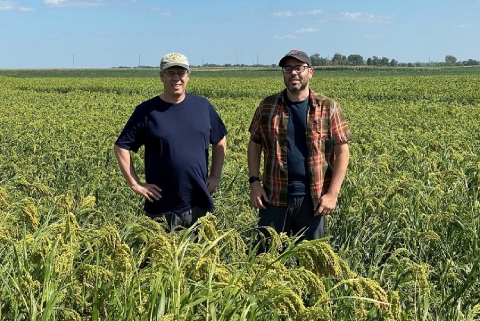By Matt Kelley (Radio Iowa)
A grain that millions of people in Asia and India eat every day is almost unheard-of in Iowa, but a researcher at Iowa State University says it has the potential to make Midwestern agriculture more resilient, more profitable and more earth-friendly.
Pat Schnable, director of ISU’s Plant Sciences Institute, says proso millet is an ideal alternative crop to corn and soybeans, especially as water becomes more scarce, both in drought-stricken Iowa and globally.
“Proso millet is extremely water efficient,” Schnable says. “We did some research and discovered that it is probably the most water efficient grain on the planet. It uses about half as much water per bushel of grain compared to corn or wheat. It’s even more water efficient than sorghum.”
Calling proso millet the crop of the future, Schnable says the cereal grain is extremely versatile as it’s eaten by vast populations of humans in products from porridge to bread, and it’s also an excellent livestock feed. Plus, he says, millet is already growing well in plots of Iowa soil, thanks to one big advantage.
“Farmers can grow millet without any application of nitrogen fertilizer,” he says. “So even though the yields are 70 to 80 bushels an acre, here in Iowa, by not having to add nitrogen fertilizer, that can make it competitive with corn and beans.”
By comparison, corn is now grown on some 90-million acres nationwide, while millet is grown on perhaps 700-thousand acres. Schnable would like to see that figure grow tenfold in the years to come.
“It’s a very easy crop to grow in Iowa and uses exactly the same equipment that you’ve got for corn and beans, so same planters, same combine,” he says. “You do need to get a canola plate for the planter but that’s a pretty trivial expense, just because it’s smaller seeded than corn and beans.”
The grain is gluten-free, so it’s being used domestically in various types of 12-grain breads — and it’s even used in those big mixed bags of bird seed. Yet another advantage, Schnable says proso millet can be substituted for corn in the ethanol-making process.
“Because we’re not adding commercial fertilizer, nitrogen fertilizer, it has a low carbon intensity score, which starting in 2025, the federal government is going to start handing out credits to ethanol plants that use low carbon intensity feedstocks, like millet,” Schnable says, “so we see a real growth opportunity there.”
Schnable and his son, James — who’s an agronomy professor at the University of Nebraska-Lincoln — founded an Ames-based company called Dryland Genetics. Its mission is to make proso millet the climate conscious choice of farmers and consumers.




